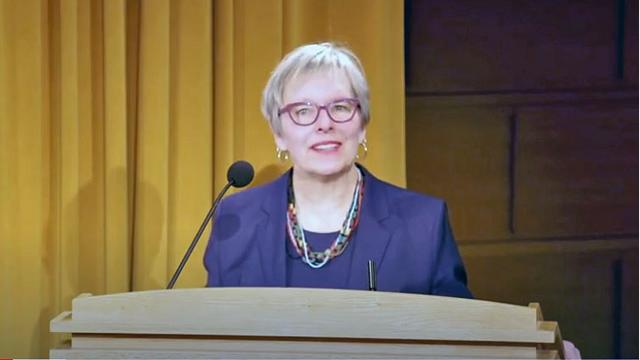For the first time since the tradition began, the State of the School address by the dean of the Humphrey School of Public Affairs is being delivered in a virtual format, allowing viewers to stream the presentation from their homes.
In her address, Dean Laura Bloomberg focused on the many challenges the Humphrey School, and the nation, faced over this past year, as well as the opportunities that lie ahead.
Bloomberg noted the coronavirus pandemic is only one of several major crises that emerged in 2020; unprecedented and devastating weather events occurred as a result of climate change, and the outrage over the death of George Floyd at the hands of Minneapolis police officers pushed the issue of racial inequities and public safety into the forefront of public debate.
“Each one of these intersecting [crises] disproportionately impact some people more than others,” she said.
Bloomberg praised the School’s faculty, staff, and students for their flexibility and creativity in adapting to the rapidly changing circumstances.
Meeting the Challenge
“It would be utterly impossible to recap all the ways that our Humphrey community has stepped up to face the cascade of onslaughts this past year,” Bloomberg said, but she highlighted several examples.
- In response to the pandemic and resulting restrictions on in-person instruction, the Humphrey School building closed in March and quickly transitioned to a virtual academic learning environment.
- Many faculty and staff pivoted their research toward understanding the trajectory of the pandemic and its impact on people in such areas as housing, employment inequities, and transportation policy.
- In the aftermath of George Floyd’s death, faculty research into racial disparities in Minnesota generally and in public safety specifically gained new attention.
- The School hosted multiple public forums on race, public safety and policing in America.
- Bloomberg and other University leaders worked together to establish an internship program for students at the state Legislature to work on racial justice policies.
“Despite all the substantial challenges of this past year, I stand before you today and tell you that the state of the Humphrey School is indeed strong,” Bloomberg said. “We have most certainly been tested this past year and we have learned hard lessons about living our values. We have a sturdy foundation and an enormously talented community of partners, scholars, students, and alums that keep us at the leading edge of public affairs education.”
Going forward, at the urging of students, Bloomberg said the School will continue addressing internal equity issues by “doubling down on our schoolwide equity and inclusion goals.”
“We are taking a careful look at our curriculum through a lens of our values—adding courses where we need to and shifting learning objectives where it seems warranted,” she said. “We are maximizing our efforts to extend financial aid to highly qualified students so cost is less of a barrier. And we are determined to continue to support our Junior Summer Institute, the residency program for underrepresented undergraduate students interested in public policy.”
In addition, the Humphrey School is participating for the first time in the President’s Postdoctoral Fellowship Program in partnership with the University of California, which is designed to encourage outstanding PhD students of color to enter the field of higher education and seek faculty careers. Two candidates have been offered positions at the Humphrey School beginning this fall.
Looking Ahead
What the School’s operations will look like six months from now, when the new academic year begins, is hard to predict at this point. Bloomberg said Associate Dean Catherine Squires is beginning to figure that out.
“I’ve asked her to lead our planning efforts to emerge from the pandemic and re-enter a learning environment that will have been forever changed,” Bloomberg said. “I believe that will take creativity, innovation, compassion, and a huge amount of wrangling of ideas and people and strategies and policy change.”
Bloomberg noted one bright spot: applications from prospective master’s degree students are up by one-third compared to last year at this time.
Given that plans for the next several months are still in flux, Bloomberg encouraged the Humphrey School community to become more comfortable with the chaos of the times. She referred to the work of a man named Dee Hock, a banking executive who became an expert in organizational change.
“He proposed that we bring a little order to the chaos and a little chaos to the order,” Bloomberg said. Hock coined the term "chaordic" from the words "chaos" and "order." Hock believes it is in the blending of an organization’s chaos and order that innovation, creativity, and insight happen.
“It’s not always comfortable to move smoothly into that chaordic space. And yet, I think Dee Hock was right: this is where real learning happens,” Bloomberg said. “It is where I want our School to be. When I think about what happens in our classrooms right now in this remote environment, in the midst of a pandemic, racial reckoning, climate crisis, all of those things— we’re creating a chaordic space in our classrooms.”
“My greatest hope for members of this School community as we approach this very consequential year ahead of us is to do so with an openness to blending a bit of our traditional sense of order with a little bit of messiness and chaos of the world as it is. Let’s approach it as a chaordic path toward new possibilities, broadened partnerships, and tremendous new potential in a post-pandemic reality.”


